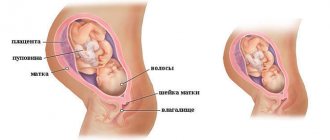What documents are needed to register?
A woman will need the following documents:
- Passport;
- Compulsory medical insurance policy;
- SNILS – insurance certificate;
- Registration of place of registration; if you don’t have it on hand, you can provide a copy of the apartment rental.
When all the documents have been collected, you need to contact the manager or chief physician. He writes a statement on the basis of which he will be added to the registry. You can choose an obstetrician-gynecologist who will monitor you throughout your pregnancy.
Registration is a largely bureaucratic process that requires filling out many documents and establishing different cards. The obstetrician-gynecologist will always keep the pregnancy and postpartum card created during registration. In it, he will note each appearance of the pregnant woman and make notes about the state of health of the pregnant woman and the fetus.
An Exchange Card is also filled out and issued to the pregnant woman. This document is extremely important, because it notes all the results of the tests performed, the condition of the pregnant woman during scheduled and unscheduled examinations by a gynecologist. You should always carry your exchange card with you, even if you are just going to the store. If you suddenly become ill and have to urgently go by ambulance to the hospital, the exchange card will become a valuable source of information about your health for the attending physician.
After childbirth, the exchange card remains in the obstetric hospital; no papers from it are returned to the mother in labor. Pay attention to this. If, out of ignorance, expectant mothers store in exchange a photo of the baby taken with a 3D ultrasound, after giving birth they will not receive these pictures so dear to their hearts back.
According to the legislation of the Russian Federation, when registering for pregnancy, a woman has every right to undergo all prescribed tests and diagnostic methods free of charge.
What is the deadline to register?
Doctors recommend registering before 12 weeks. If this condition is met, working women are paid a lump sum benefit (half the minimum salary).
Not all medical institutions accept registration before the 7th week, since this period is extremely unstable and miscarriages can occur. This does not mean that you don’t need to go to the doctor before 7 weeks!! On the contrary, an early visit to the gynecologist from the moment you find out about pregnancy is mandatory, if only to make sure that everything is going well. It’s just that you won’t always be registered on your first appearance.
On the other hand, you shouldn’t delay the placement either, because in the 1st trimester the fetus begins to actively grow and develop, the formation of vital organs and systems occurs, so it is very important to be under the supervision of a doctor during this period. Another reason why you should not wait 11-12 weeks is the first screening, which is carried out strictly at 11-13 weeks, because later it is not informative.
If you want to undergo the first screening for free, be prepared for a possible queue. This is why it is so important to receive a referral for screening in a timely manner - missing a deadline means missing the most important study of the 1st trimester.
How is the very first appointment with a doctor?
This exciting moment has arrived when a woman sees her doctor for the first time regarding pregnancy. At the very beginning, the doctor will collect anamnesis in order to know all the most important information.
Anamnesis of life
The doctor clarifies:
- Family status;
- information about the height and weight of the pregnant woman at birth and similar information about the father of the child. The presence of a number of diseases in a spouse is a reason to prescribe additional tests, for example, for karyotype;
- the presence of diseases in the spouse, parents and other relatives of the pregnant woman;
- place of work and occupational hazards (this is very important, as it can adversely affect the health of the expectant mother and baby). For example, if a woman works as a hairdresser, then constant exposure to toxic substances can lead to adverse consequences.
- living conditions. There is a psychological factor involved here (stress, anxiety).
Medical history
The doctor needs to know about diseases suffered throughout his life, surgical interventions in various organs and systems.
Obstetric and gynecological history
The doctor needs to know:
- past and existing diseases of the reproductive system of the pregnant woman, as this directly affects the course of pregnancy;
- gynecological operations performed: abortions, uterine curettage and others;
- the number of abortions, pregnancies and births is an important factor;
- the results of each pregnancy, the progress of labor, the sex and weight of newborns;
- if there was a caesarean section - indications for it, the course of the operation and recovery after it;
- if an abortion was performed, at what period, what complications were there after that.
Allergy history
The doctor should be aware of allergic reactions to foods and drugs in order to choose the right treatment.
At the doctor’s appointment, a gynecological examination is performed, during which the gynecologist will take a smear to determine the degree of cleanliness of the vagina and assess the condition of the woman’s reproductive organs.
After the examination, a number of preventive tests are prescribed:
- general blood test during pregnancy and urine;
- determination of blood group and Rh factor;
- hemoglobin test during pregnancy;
- detection of the concentration of the hormone hCG in the blood.
Low levels of this hormone may indicate an ectopic pregnancy. The doctor needs to know all these indicators so that pregnancy and childbirth proceed favorably.
Maria Telesheva, obstetrician, specially for Mirmam.pro
Documents of the expectant mother
- One of the main documents issued to a pregnant woman at the antenatal clinic is an exchange card. It contains basic information about the course of pregnancy necessary for continuity between medical institutions. An exchange card is issued at 22–23 weeks of pregnancy. The expectant mother should always have it with her in case of emergency seeking medical help. At each subsequent visit to the antenatal clinic, you must bring an exchange card with you to record examination data and research results on it.
- A certificate of incapacity for work (prenatal and postnatal leave) is issued by an obstetrician-gynecologist managing the pregnancy at 30 weeks of pregnancy at a time for 140 calendar days (70 calendar days before childbirth and 70 calendar days after childbirth). In case of multiple pregnancy, a certificate of incapacity for work is issued at 28 weeks of pregnancy for 194 calendar days (84 calendar days before birth and 110 calendar days after birth).
- In addition, if cases of incapacity for work arise before the start of maternity leave (for example, the threat of termination of pregnancy), the obstetrician-gynecologist at the antenatal clinic also issues sick leave to the expectant mother.
Where to go
Monetary compensation for a young mother (family) is provided by the Social Insurance Fund, the employer company, and the Pension Fund of the Russian Federation.
The Social Insurance Fund transfers funds due to a woman for:
- early registration in a gynecological consultation;
- sick leave for pregnancy and childbirth;
- birth of a baby (one-time payment).
Documents are transferred by:
- employer's accountant;
- employee of the university dean's office (if the mother is a student);
- employee of the MFC or USZN (if the woman is officially considered unemployed).
The Pension Fund of the Russian Federation is responsible for providing a certificate for maternity capital and “Putin’s payments.” Documents for setting up payments are sent by MFC employees. The employer and UZSN provide a monthly benefit for up to 1.5 years, paid to a mother on maternity leave.
To accrue funds, documents are submitted to:
- accounting (HR department) of the organization;
- MFC (in case of lack of employment).
Early placement allowance
If a woman registers before the 12th week of pregnancy, she is provided with a payment in the amount of 675 rubles 15 kopecks.
To apply for compensation, you must:
Apply to your place of work, study or social security service with an application, attaching a certificate issued by the doctor to whom the young mother applied.
The benefit can be received within a 6-month period starting from the end of maternity leave.
Money is credited within a 10-day period (until the 26th day of the next calendar month) after the organization receives the necessary documents.
Where to be monitored during pregnancy?
Can you go to any antenatal clinic, or do you need the one you are assigned to at your place of registration?
According to Russian legislation and the order of the Ministry of Health, a pregnant woman has the right to be observed free of charge in any antenatal clinic located in any locality in our country, regardless of her residence permit (registration), citizenship and compulsory medical insurance policy. You have four options at your disposal. Two main ones: antenatal clinic at the place of residence or at registration. And two more: a paid clinic or a more conveniently located antenatal clinic (you will need to unlink from the consultation at your place of registration).
Think about which option would be best for you: read reviews, ask friends who are pregnant or have recently given birth. And don’t forget to consider the territorial factor: the path to the doctor should not be long and inconvenient, because in the later stages long walks can become difficult.
You may want to be observed in a paid clinic. It's no secret that more comfortable conditions have been created here for a pregnant woman. As a rule, there are no queues; all examinations are carried out in one place. The only, but significant, disadvantage of paid clinics is the high cost of service. If you choose paid pregnancy care, do not forget to make sure that the clinic has the appropriate license.
For your first visit to the doctor, take with you your Russian passport and compulsory health insurance policy.
The best time to contact an antenatal clinic
Surely every pregnant woman wonders when is the best time to go to an antenatal clinic. We have found the answer to this question - ideally, it is better to do this before the 12th week of pregnancy. The fact is that it is in the early stages that deviations in the development of the fetus can be detected. The sooner the doctor finds them, the easier it will be for him to correct the condition of the mother and child. But if everything is clear about going to the doctor, then when should you think about registering during pregnancy? According to Russian law, a woman must register at a medical institution that provides services in the field of obstetrics and gynecology. The package of documents does not change depending on the status of the medical institution and remains standard:
- passport;
- medical insurance;
- SNILS;
- fluorography results (here it is worth paying attention to the fact that pregnant women cannot undergo a similar procedure, so the examination should be done before conception);
- an application addressed to the head physician of the hospital to which it is being registered.
Grounds for refusal to pay benefits
Benefits due at the birth of a child (with the exception of “Putin payments”) are assigned to all young mothers without exception. Refusal to transfer a sum of money may be due to the lack of required documents. If missing papers are provided, money is transferred to the account of the woman who gave birth.
“Putin payments” are only available to low-income families who gave birth to their first child in 2021
Refusal to assign funds is:
- family income exceeding the required standards (above 1.5 minimum wages per family member);
- birth of a child before January 2021;
- the woman has other, previously born children (if only the father has another child, then the mother is given an allowance);
- the child reaches the age of 1.5 years;
- filing a statement from the child's father (if the mother is alive);
- deprivation of parental rights.
The decision on payments occurs within 30 days from the date of submission of the application.
Any woman expecting a baby must register her pregnancy in a timely manner. This condition is specified in the legislative norms of the Russian Federation, implies a monetary reward and is aimed at controlling the condition of the expectant mother and her baby.










